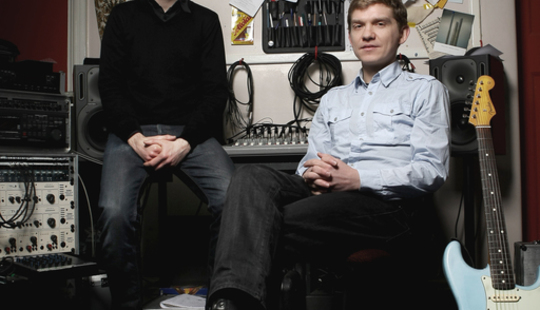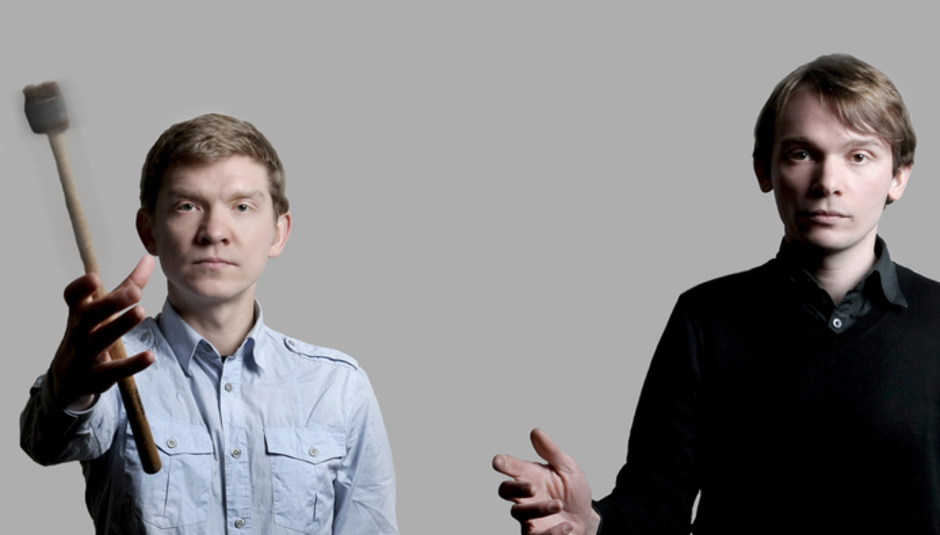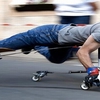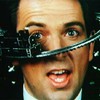So you like Field Music right? As in, you like them to the tune of about 2,000 words? Well in that case you'll be delighted by this truly epic guide to the band's 20/21-track OPUS Field Music (Measure)... and IN A TWIST the brothers Brewis will be offering their thoughts not on their own individual songs, but each other's... STRAP YOURSELVES IN, PEOPLE.
'In the Mirror' – Peter on David’s song
Built around an unceasing dissonant piano chord, this come across as one of Dave's darker songs. We recorded it in a few takes, me on piano and Dave on drums and then Dave built the rest of the music around that. The bass line is very melodic, very measured and yet unlike a McCartney style thing. It comes across as quite unsettling. We never really ask each other to justify our lyrics to each other so we often get it wrong in interpretation. The words seem to get at an idea of getting close to a solution, but only recognising it in reflection, and perhaps hopelessly not being able to get to it. Also, incidentally, the intro reminds me of the film Dune.
'Them That Do Nothing' - David on Peter's Song
Lyrically, this one owes our lot to our dad - if either of us are getting down at ourselves for screwing something up, he'll say, quite sensibly that the only people who make no mistakes are the ones who don't do anything, or in finest mackem-speak, "Them that dee nowt, mak nee mistakes". The music shows our love of Lyndsey Buckingham and Fleetwood Mac - Peter wanted a song where the rhythm came from a really clipped acoustic guitar and the drums and bass embellish around that.
Video: Field Music: 'Them That Do Nothing'
'Each Time Is A New Time' – Peter on David’s song
Here Dave brilliantly takes a rock convention (a bluesy guitar riff) and shifts it somewhere outside of itself by a little rhythmic trick. We never think in time signatures but we do like chopping off beats rather than extending things to fit four beats. I think this one exudes the sense of fun we had making the record. Special mention must go to Dave's bizarre yet perfect drum fill just before the second verse.
'Measure' - David on Peter's Song
This is one of my favourites on the new record, partly because it was such an odd production - there are a couple of different drums parts which pretty much do their own thing in each speaker and we really didn't know if the song was going to work until both sides were done and stuck together. It's also one of the songs where we didn't contrive extra sections for pieces of music which we didn't think needed them - we didn't feel the need to make every song into a straightforward verse/chorus/verse/chorus/middle-8/half-verse/double-chorus thing! Not that we've ever done that very much. We had fun doing the vocals for this one, singing around one microphone trying to do David Bowie impersonations.
'Effortlessly' - David on Peter's Song
'Effortlessly' is full of examples of how great a musician Peter is - the flow of the drums is perfect (not metronomic, but just right - though Peter doesn't believe me and often winces when he hears it), his bass-playing is fantastic and it's full of fantastic melodic guitar breaks, especially the long one in the last verse. We generally don't quiz each other on the meanings of our lyrics but I hear this one as a slyly funny take on moments of social awkwardness, perhaps especially between musicians, but, as I say, that's just my interpretation. Perhaps Peter will correct me now that I've written about it.
'Clear Water' – Peter on David’s song
Again, Dave creates a kind of atonal blues with two guitars playing against and yet with each other, pulling apart and together in the space of a few seconds. The lyrics are pretty clear to me; Imagine the water washing away the stress. It's a kind of self-help song for Dave I suppose. I think he imagined the end of it being a kind of semi-spiritual chant for audience participation. That was until we realised how difficult it was to sing.
'Lights Up' – Peter on David’s song
David has told me there's a story to this song. I'm not sure what it is but it seems like he's drawn upon some personal experience to create a really dramatic song. We didn't really do high drama on the first two field music albums but we've changed a lot since then and realise that a bit of drama can bring out some different aspects of performance. For instance I find Dave's guitar solo on this a really emotive performance; and the drum fills are too. Emotional drum fills; how can that be? I think that's one of the huge benefits of David and myself playing everything on the records. There's can be a singular emotional drive on the performances of different instruments. As well as a conversational things between me and Dave if we need it.
'All You'd Ever Need To Say' - David on Peter's Song
We haven't really embraced our love of riffing-out on previous FM albums, so this is a good one for blowing off some cobwebs. Peter did all of the singing on this himself and, strangely, it reminds me of both Neil Young with Crazy Horse and of Cream, though I think that's what Peter was going for. I really like the end section, which nods to Bitches Brew or Filles De Kilimanjaro-era Miles Davis; lots of ominous-sounding percussion and disonant electric piano soloing.
'Let's Write a Book' – Peter on David’s song
I had been on holiday for a few days in Barcelona and I got back home to find Dave had recorded this. I was totally astounded. The percussion, the riff the drums, the vocals, the guitar licks are all visionary. You can't make music like this by committee. Of course there're obvious winks to Prince like the wah-wah guitar and the incessant four-four beat, but the shifting riff, the cross bar drum-fills the octaved vocals are all purely David Brewis. It's probably my favourite track on the album. I just wish I could say I had something to do with it!
'You And I' – Peter on David’s song
We recorded this together; me on drums, Dave on guitar. Dave wanted it to be sparse and uncluttered and have a definite upward dynamic throughout the song. I thought we'd recorded a pretty good take but it wasn't until the vocals went on that it really took off. Dave's singing really chimes on this and again he brings a sense of darkness and drama to it. It seems to me that he can map his feelings and express himself through arrangement and performance respectively. Not many people can do that. The two things have to be second nature for that to be possible.

'The Rest Is Noise' - David on Peter's Song
Ah, the start of disc 2. This is one of the first songs we recorded and probably one of the moments where I really thought, "cool, recording this album is going to be lots of fun" - I think we both understood what we were aiming for. Peter brought in the song, we set up to record drums and piano, had a few run throughs and did a couple of takes and that was that. It's got a great riff in the middle, it's got a great Jimmy Page-esque guitar solo at the end, it's got a weird phasey piano intro, it's got some slightly-daft Kate Bush-aping backwards vocals. I would also say that, as a composition, it's more like something that would have fit on an earlier Field Music album than most of the rest of the record.
'Curves of the Needle' - David on Peter's Song
We recorded the piano and drums for this on the same day as 'The Rest Is Noise', though for this one I'd already heard a demo Peter had done, which already had those Crazy Horse-inspired backing vocals all mapped out and they sounded great - we ended up taking a long time trying to capture a similar swell of vocals on the proper recording and, I think, we ended up with Peter doing all of those vocals on his own. As the recording progressed, I started to understand the textural thing that Peter was going for, probably partly inspired by Talk Talk - we haven't done anything as sparse or as slow as this before so it was interesting. We usually use the toilets underneath our studio (we're based in an old school which is now a community enterprise building) as a reverb chamber when we're mixing but for this song the sound from the loos was too pingy and bright so we ran cables down to the main hall for a bigger, darker, more echo-ing reverb.
'Choosing Numbers' - David on Peter's Song
Peter recently explained, while we were doing an interview, that the lyrics to this were inspired by the constant barrage of pin numbers and passwords that we are lumbered with these days - which wasn't my interpretation at all, though admittedly my interpretation was vague to the point of being non-existent. It had crossed my mind that by 'numbers', he actually meant songs. Ah, well. This one structurally harks back to the first FM album where one section of music morphed into another and then another and then maybe got back to where it started or maybe didn't. Peter seemed a bit worried that the choral section sounded like Oasis but once we started putting the backing vocals on, singing round one mic again and having a lot of fun, it became fairly clear that we will never, ever sound like Oasis. There's a little melodic nod to Erasure in one of the backing vocal parts but it's very subtle. Peter put the found-sound loop together at home - there's one really long sample of a pen rolling along a table which works beautifuly in the context of the loop but it's not until the very end (turn it up! headphones!) that you hear the whole thing clearly.
'The Wheels Are In Place' - David on Peter's Song
I believe this is actually the first song we recorded for the album, with Peter playing guitar and me playing drums and a student on work-placement from the university course we'd been teaching on very tentatively helping to put up microphones. Pete was very careful to get the right texture from the rhythm guitars. He'd written almost all of The Week That Was album on piano and I think this was the start of him writing on guitar again. It was nice to kick off with something looser and more rocking than things we've done before.
'First Comes The Wish' – Peter on David’s song
Dave called this his PJ Harvey song when he first showed it to me. It seems more like a David Brewis song to me. The lyrics are probably my favourite on the record. For me they allude to lots of ideas and thoughts - very salient ones, but I can interpret then in different ways. Perhaps the fact there is no repetition in the lyrics gives it more of a narrative quality. The chorus (if there is one) is at the end of the song. Also, Dave's slide guitar playing is great on this (as it is throughout the album). He's got a real knack for slide.
'Precious Plans' - David on Peter's Song
For me, this is Peter's best vocal performance ever. The vocal on here is also pretty much the very last thing we recorded on the album - he needed quite a lot of persuading to finish the song because he didn't think that he'd played the guitar part well enough (which seems a bit insane to me because the guitar playing is immaculate and it's a very, very tricky part to play, as I've since discovered when I've been trying to learn it in case we do it live). We were keen with this album to do some songs which weren't so reliant on drums. As it happens, we're both drummers at heart and are always thinking of ways to accentuate or skew a song's rhythm using a kit, so this ended up as the only song with so little drumming. And, of course, the surge at the very end where the drums finally come in is one of the best bits on the whole record. This song is up there as one of my absolute favourites on the album - it has the perfect mix of directness and ambiguity and a mix of hopefulness or defiance with melancholy which sums up the mood of the album for me.
'See You Later' - David on Peter's Song
This is the start of the neatly-segued fourth side of the album. I'll leave off talking about the found sound pieces - they're more contextual here than compositions in their own right. It's mostly instrumental and features our regular trio of string players and our friend, John Beattie, playing cornet. The piano and vocal section in the end is another of my favourite moments on the record, in part because doing the singing was a challenge which we really enjoyed taking on; not because the notes were difficult to sing, but just because we were aiming for a very specific texture, which involved the two of us singing into one mic and being very careful about phrasing together and positioning ourselves from line to line (and note to note) to get it just so. We also sung it next to an open window during fairly heavy rain, but I don't think you can really hear it.
'Something Familiar' - David on Peter's Song
This is Peter's big epic number on the album. The first section sounds a lot drier and more clipped than most of the rest of the album, but then it goes all over the place - there are little allusions to all sorts of things dotted through the song - a pinch of 'Ashes to Ashes' here, some odd, dissonant harmony there, a huge guitar riff build-up and even a wee dram of 'Great Gig In The Sky' at the end.
'Share The Words' – Peter on David’s song
I'm pretty sure this was the first song that Dave wrote for the album as we'd played it in the School of Language set the previous year. I remember listening to the first recording Dave made of it and I was overwhelmed with a kind of nostalgia and optimism (there might even have been a tear in my eye). I think it was around that point that I'd been thinking about making the possibility of making another field music record and this song made me feel like we should definitely do it. Musically, it's got a funkiness that we perhaps even tried to avoid on the previous albums. We'd both been thinking about how someone like David Bowie approached funk as opposed to the grooviness of the British late Eighties and Nineties bands. I think this is Dave's idea of a North-Eastern funk. I also think me and Dave had been trying to outdo each other in the Jimmy Page guitar solo dept. The evidence at the end of this track is that he won!
'It's About Time' - David on Peter's Song
I think that this is the first fully instrumental track to appear on a Field Music album (not counting 'Rockist Part 2' on the School of Language record). The first section is built around looped parts for string trio, probably inspired a little by Penguin Cafe Orchestra. Towards the end of the 'song' section is a single double-tracked phrase of lead guitar which is probably another of my favourite moments on the album, and definitely the most McCartney-esque! After that things take a turn for the experimental. It's a piece made up of field recordings (in this case, of the streets around Sheildfield in Newcastle where Peter lives) with an overlaid string accompaniment (made up of string phrases and chords from previous, mostly-unused recordings juxtaposed against one another). I think we're prepared to take a bit of criticism for these - it's not the kind of thing which usually goes on a rock album - but we wouldn't have put them on if we didn't think they were beautiful and interesting pieces of music which fit with the tone of the record, especially if you listen on big speakers or with headphones on and really immerse yourself. And if you really can't cope with it, or you're listening in the car or on a train where you can't hear it properly, at least it's at the end of the record so you can always just press stop. Peter would be able to talk about the concepts for this in more depth than I can - for me, it embraces the idea that all manner of sounds can be musical if you let yourself hear it in that way. All Peter's really done here is to edit long stretches of 'found' music into something with a clearer musical structure and then to let more obviously-musical instrumentation interact with it. When I first heard it, I was surprised by how emotionally affecting it was.
and... 'Louis' (this is the second half of 'It’s About Time') - David on Peter's Song
Remember when hidden tracks were in vogue? This is another of Peter's 'found-sound' pieces, this time recorded in a cafe in Sunderland (the same one in which the cover for Tones of Town was photographed), called Louis. It's a bit of a Sunderland institution and if anyone ever comes to visit us and they want a real taste of the town, we'll take them there. Peter spent a few days in there recording the sounds of the place (and interviewing the staff and customers) with the idea of condensing the recordings down into some kind of representation of the flow of a Louis' day. Brilliantly, they very rarely play music so the other 'musical' sounds (customers whistling, saucers clinking, the grind of the coffee machine, footsteps, laughter and chatter) all came to fore once Peter started editing it together. Like in the previous piece, he then overdubbed instruments to highlight the music which was already there, this time with piano and marimba. Weirdly, I find some of this really catchy, like the jazzy tune someone whistles and the sound of someone with a limp walking in, which Peter's edited into the aural version of a Gene Jelly dance routine. Have I convinced you to listen right to the end yet?






















